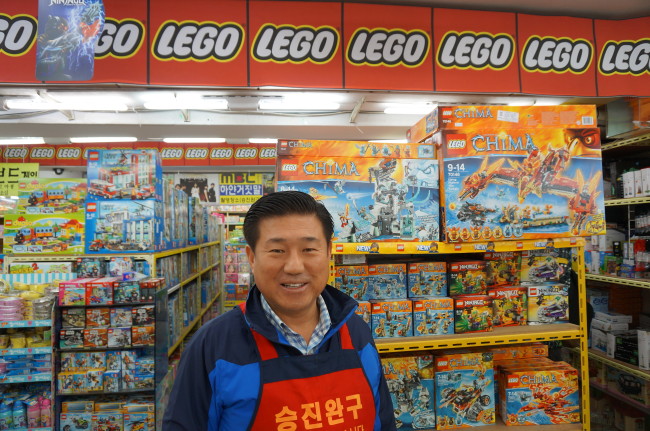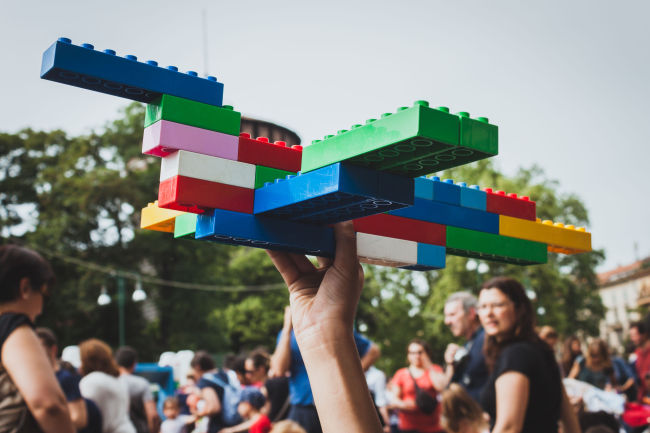South Korea is flooded with digital entertainment, ranging from mobile gaming apps to live streaming of personal lives.
Oddly enough, the digital onslaught has not killed the old appetite for what scholars describe as the “multisensory experience” unique to analog products.
One such analog product group through which Koreans are finding a nostalgic reprieve from digital information overload is toys.
Toys are no longer just for kids. The toy market dedicated to Korean adults alone is an estimated 700 billion won ($639.1 million) industry that is rising at an annual rate of 20 percent, according to local reports.
Oddly enough, the digital onslaught has not killed the old appetite for what scholars describe as the “multisensory experience” unique to analog products.
One such analog product group through which Koreans are finding a nostalgic reprieve from digital information overload is toys.
Toys are no longer just for kids. The toy market dedicated to Korean adults alone is an estimated 700 billion won ($639.1 million) industry that is rising at an annual rate of 20 percent, according to local reports.

Adults enjoying hobbies considered more suited to children ― dubbed by local media as “kidults” ― are behind the steady growth.
Mostly men in their 30s and 40s are paying for often expensive toy products and joining online communities to discuss their shared interests, particularly in Lego sets, robot, action figurines and drones.
A popular Lego online community, Brick Nara, has over 120,000 active members who share and give feedback on each other’s toys and constructions. A quick search yields about 3,000 such online communities of mainly adult members in Korea.
One successful corporate businessman surnamed Kim, who is in his 40s, said he waits for the weekends, not just to rest, but also to play with his “quadcopter” drone.
K-pop singers like Kim Dong-wan, 35, from boy group Shinhwa, have also joined the growing number of men flying drones during their leisure time.
Kim Mun-cho, a professor in sociology at Korea University, said in an interview last month, “As fixed preconceptions about adults behaving like adults and children behaving like children erode, the recreational culture for adults is expanding in various directions.”

Korea, together with Japan, has the most Toys “R” Us stores in Asia, with almost 100 licensed outlets of the toy store retailer operating across the country.
Limited edition Lego sets that sell out in stores are often resold at higher prices online as second hand products or collectors’ items.
Seoul’s historic Dongdaemun wholesale toy and stationery market, which is a 60-year-old alleyway containing some 125 jam-packed shops, is a hidden gem among adult and children toy devotees.
A staff member named Seol Chang-wook, who works at Daekwang PR, a shop specializing in drones and remote-controlled cars, said that about a quarter of daily customers are men, mostly in their late 40s.
“Some adults become personally interested in toys after initially intending to buy them for children,” said Seol.
The most successful shop in the market is Seung Jin Toy, which specially retails Lego toy products, chalking up annual sales of 3 billion won ($2.7 million) and attracting over 1,000 visitors daily.
“Children these days don’t have that much time to play because of their studies, but parents are still willing to enhance their creativity through toys,” said Song Dong-ho, who runs the store. Sales tend to peak on Children’s Day, Christmas and children’s birthdays.
Song said toy sales have grown tenfold in the 30 years since he first opened the business in the early 1980s, though it suffered a downturn during the 1997 Asian financial crisis.
Near the area, Art Toy Culture 2015, a three-day toy fair and exhibition, is underway at Dongdaemun Design Plaza in Seoul. The cultural event offers a glimpse into global toy design trends, with works on show by 150 toy designers both from Korea and abroad.
Art Toy Culture 2015 builds on the success of its precedent last year, which drew about 42,000 visitors and sold 1 billion won ($913,000) in toys over a five-day run.
On a larger scale, Korea is currently constructing the world’s biggest Legoland theme park attraction in Chuncheon, Gangwon Province, which is scheduled to open in March 2017.
Legoland Korea, which will also be the world’s first to be located on an island, is part of Chuncheon city’s wider efforts to market itself as a “future global children’s city,” attracting investment from toy companies across the world.
In the meantime, the penchant for analog toys among adults and children shows no sign of waning ― if anything, it is fueling fresh energy into the global market.
As one example, Lego is developing its hybrid analog-digital lines, Fusion and Mindstorms, which both incorporate digital technology, as play trends evolve in an increasingly digitized age.
By Yoon Sarah (sarah356@heraldcorp.com)
-
Articles by Korea Herald



![[Exclusive] Korean military set to ban iPhones over 'security' concerns](http://res.heraldm.com/phpwas/restmb_idxmake.php?idx=644&simg=/content/image/2024/04/23/20240423050599_0.jpg&u=20240423183955)




![[Pressure points] Leggings in public: Fashion statement or social faux pas?](http://res.heraldm.com/phpwas/restmb_idxmake.php?idx=644&simg=/content/image/2024/04/23/20240423050669_0.jpg&u=)











